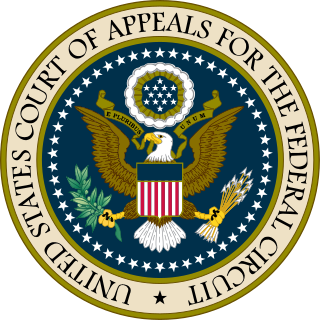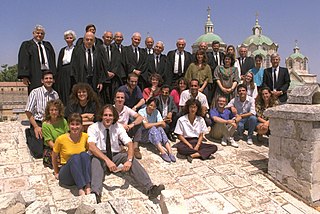
The United States courts of appeals or circuit courts are the intermediate appellate courts of the United States federal judiciary. The courts are divided into 13 circuits, and each hears appeals from the district courts within its borders, or in some instances from other designated federal courts and administrative agencies. Appeals from the circuit courts are taken to the Supreme Court of the United States.

The United States Court of Appeals for the Ninth Circuit is a federal court of appeals that has appellate jurisdiction over the district courts in the following districts:

The United States Court of Appeals for the Seventh Circuit is a federal court with appellate jurisdiction over the courts in the following districts:

The United States Court of Appeals for the Federal Circuit is a United States court of appeals headquartered in Washington, D.C. The court was created by Congress with passage of the Federal Courts Improvement Act of 1982, which merged the United States Court of Customs and Patent Appeals and the appellate division of the United States Court of Claims, making the judges of the former courts into circuit judges. The Federal Circuit is particularly known for its decisions on patent law, as it is the only appellate-level court with the jurisdiction to hear patent case appeals.

The University of Minnesota Law School is the law school of the University of Minnesota, located in Minneapolis, Minnesota. The school confers four law degrees: a Juris Doctor (J.D.), a Master of Laws (LL.M.), a Master of Science in Patent Law (M.S.P.L.), and a Doctor of Juridical Science (S.J.D.). The J.D. program offers a number of concentration opportunities, as well as dual and joint degree options with other graduate and professional schools of the university.

A law clerk or a judicial clerk is an individual—generally an attorney—who provides direct assistance and counsel to a judge in making legal determinations and in writing opinions by researching issues before the court. Judicial clerks often play significant roles in the formation of case law through their influence upon judges' decisions. Judicial clerks should not be confused with legal clerks, court clerks, or courtroom deputies who only provide secretarial and administrative support to attorneys and/or judges.

Simon Ernest Sobeloff was an American attorney and jurist, who served as Solicitor General of the United States, as Chief Judge of the Court of Appeals of Maryland, and as a United States Circuit Judge of the United States Court of Appeals for the Fourth Circuit.
Karen Nelson Moore is a United States Circuit Judge of the United States Court of Appeals for the Sixth Circuit. Her chambers are located in Cleveland, Ohio.

Gilbert Stroud Merritt Jr. is an American lawyer and jurist. He currently is a Senior United States Circuit Judge of the United States Court of Appeals for the Sixth Circuit.

George Steven Agee is a United States Circuit Judge of the United States Court of Appeals for the Fourth Circuit and a former Justice of the Supreme Court of Virginia.
The British Columbia order of precedence is a nominal and symbolic hierarchy of important positions within the province of British Columbia. It has no legal standing but is used to dictate ceremonial protocol at events of a provincial nature.
- The Queen of Canada
- The Lieutenant Governor of British Columbia
- The Premier of British Columbia
- The Chief Justice of British Columbia
- Former Lieutenant Governors of British Columbia
- Hon. Judith Guichon OBC
- Hon. Steven Point OBC
- Hon. Iona Campagnolo PC OC OBC
- Former Premiers of British Columbia
- Bill Vander Zalm
- Rita Johnston
- Mike Harcourt
- Glen Clark
- Dan Miller
- Hon. Ujjal Dosanjh PC
- Gordon Campbell OBC
- Christy Clark
- The Speaker of the Legislative Assembly of British Columbia
- The Members of the Executive Council of British Columbia
- The Leader of the Official Opposition of British Columbia
- Members of the Queen's Privy Council for Canada resident in British Columbia, with precedence given to members of the federal cabinet
- The Chief Justice of the Supreme Court of British Columbia
- Church representatives of faith communities
- The Justices of the Court of Appeal of British Columbia with precedence to be governed by the date of appointment
- The Puisne Justices of the Supreme Court of British Columbia with precedence to be governed by the date of appointment
- The Judges of the Supreme Court of British Columbia with precedence to be governed by the date of appointment
- The Members of the Legislative Assembly of British Columbia with precedence to be governed by the date of their first election to the legislature
- The Chief Judge of the Provincial Court of British Columbia (Vacant)
- The Commander Maritime Forces Pacific
- The Heads of Consular Posts with jurisdiction in British Columbia with precedence to be governed by Article 16 of the Vienna Convention on Consular Relations
- The Mayor of Victoria
- The Mayor of Vancouver
- The Chancellors of the University of British Columbia, the University of Victoria and Simon Fraser University, respectively.
- Lindsay Gordon
- Shelagh Rogers, OC
- Anne Giardini, OC
Justice Elizabeth Bennett is judge of the British Columbia Court of Appeal. During her term on the Supreme Court of British Columbia, she presided over two notable corruption trials.

The Colorado Court of Appeals is the intermediate-level appellate court for the state of Colorado. It was established by statute in 1891, and abolished in 1905. But re-established in 1913, and re-abolished in 1917 and established its current form again in 1970 by the Colorado General Assembly under Article VI, Section 1 of the Constitution of Colorado.

William Byrd Traxler Jr. is an American jurist who currently serves as a United States Circuit Judge of the United States Court of Appeals for the Fourth Circuit.
Robert A. Williams Jr. is an American lawyer who is a notable author and legal scholar in the field of federal Indian law, international law, indigenous peoples' rights, critical race and post-colonial theory. Williams teaches at the University of Arizona's James E. Rogers College of Law, serving as the E. Thomas Sullivan Professor of Law and American Indian Studies and Director of the Indigenous Peoples Law and Policy Program. He is also the project leader for ArizonaNativeNet, a virtual university devoted to the higher educational needs of Native Nations.
John Louis Coffey was a Justice of the Wisconsin Supreme Court and later a United States Circuit Judge of the United States Court of Appeals for the Seventh Circuit.
Karen LeCraft Henderson is a United States Circuit Judge of the United States Court of Appeals for the District of Columbia Circuit and a former United States District Judge of the United States District Court for the District of South Carolina.
Philip P. Simon is a United States District Judge of the United States District Court for the Northern District of Indiana.
Charles Casper Simons was a United States Circuit Judge of the United States Court of Appeals for the Sixth Circuit and previously was a United States District Judge of the United States District Court for the Eastern District of Michigan.
C. Michael Ryer is a Canadian lawyer and former judge serving on the Canadian Federal Court of Appeal.










